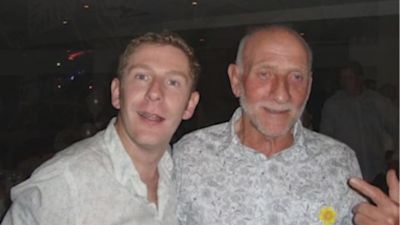Man whose terminally ill dad took his own life calls to legalise assisted dying

The son of a man who took his own life when the pain of terminal cancer became too much for him says he would have suffered a less traumatic death if assisted dying was legal in the UK.
Gareth Ward's father Norman was born in Ely, Cardiff and served in the Royal Welsh Guards. After moving to Rayleigh, near Southend, and changing career to work in construction, Norman was diagnosed with prostate cancer.
Medication kept the condition stable for more than a decade, but eventually the cancer spread to other parts of his body and he was given a terminal diagnosis.
Gareth says his dad became more frail and was suffering so much from the pain and the lack of a quality of life that he decided to take his own life in June last year.
Gareth's sister found him after he died, something for which she is now receiving counselling.
"Now obviously that impacted my sister and I experienced a lot of emotion and a lot of grief", Gareth said.
"People shouldn't have to go through what he did and what we did. People should be able to talk about it and come to terms with it before it happens, rather than my poor dad having to do that on his own without any support, and my sister having to see it. It didn't need to be like that".
Gareth believes his dad would have taken advantage of a regulated and legal way for him to end his life.
A new petition for assisted dying to be debated in the House of Commons has already had more than 40,000 signatures.
The petition says: "Dying people in the UK should not have to suffer unbearably against their wishes in their final days and weeks of life.
"Without assisted dying, some people will die without adequate pain relief, symptom control or dignity. People should not be forced to take drastic measures or travel to another country to end their own life; they should have the option of dying at home, on their own terms, just as dying people do in New Zealand and parts of Australia and the USA, as well as several countries in Europe".
'Deficits in care are not solved by taking people's lives'
But Baroness Ilora Finlay, Professor of palliative medicine at Cardiff University School of Medicine says helping people to die is not the answer to alleviating terminal patient's suffering.
"Deficits in care are not solved by taking people's lives or helping people to take their own lives. The way forward is to drive up standards of care everywhere, make sure people can access care early, so people can live well rather than waiting to die feeling frightened about what may or may not happen.
"If you say that the role of doctors is to end people's lives, you fundamentally change the law and that has risks", Baroness Finlay said.
The petition Gareth supports says assisted dying should be legal "for adults who are terminally ill and have mental capacity."
"It should be permitted subject to strict upfront safeguards, assessed by two doctors independently, and self-administered by the dying person", it continues.
Gareth says his dad would have been in a position to take that option.
"It wasn't like he shortened his life with what he did, he shortened his death. He was already dying. He was dying in front of our eyes".
Last year, politicians in the British Isle of Jersey approved the principle of legalising assisted dying in the island.
A further debate on the issue is due to be held this year, after details of the processes and safeguards have been worked up.
The new petition on the UK Government website will need 100,000 signatures before it is considered for a debate in the House of Commons.
If you're going through a difficult time, Samaritans can be contacted day or night, 365 days a year. You can call them for free on 116 123, email them at jo@samaritans.org, or visit www.samaritans.org to find your nearest branch.